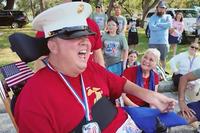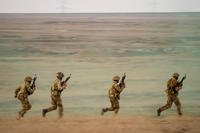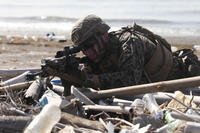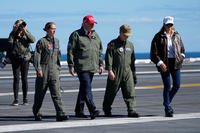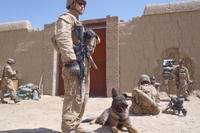Gen. James Amos, the Marine Corps Commandant, on Monday denied telling a three-star subordinate that he wanted the Marines shown in a video urinating on the corpses of dead Taliban to be “crushed” at a court martial and kicked out of the service.
“I had never, ever said that I wanted them crushed or thrown out,” Amos told National Public Radio in an interview that aired Monday. “I don’t recall at all saying that” to Marine Lt. Gen. Thomas Waldhauser, who had disposition authority to convene a court martial in the cases at the time, Amos said.
Amos also denied allegations made by defense lawyers that he exercised “unlawful command influence“ in a private meeting with Waldhauser in February 2012, a month after the urination video was posted on YouTube.
Six enlisted Marines have previously accepted non-judicial punishment or faced a special court martial on charges involving the video of scout snipers from the 3rd Battalion, 2nd Marines, urinating on the bodies of dead Taliban in southwestern Afghanistan’s Helmand province in July 2011.
In a statement issued shortly after the urination video surfaced, Amos said "I want to be clear and unambiguous, the behavior depicted in the video is wholly inconsistent with the high standards of conduct and warrior ethos that we have demonstrated throughout our history.”
“Certainly none of them have been crushed or thrown out of the Marine Corps and that’s an important point,” Amos said.
Waldhauser was senior military assistant to Defense Secretary Chuck Hagel until last summer, when he was nominated by President Obama and approved by the Senate to become the director for Operations, Plans and Joint Force Development, or J-7, with the Joint Staff under Army Gen. Martin Dempsey, chairman of the Joint Chiefs of Staff.
In a statement last summer, the Marine Corps said there was never any intent to exercise undue influence. However, Amos had come away from the meeting with Waldhauser initially thinking that he may have “compromised the situation” for the prosecution.
Speaking for the first time in detail on his conversation with Waldhauser, Amos rejected the suggestion that Waldhauser “questioned” whether he was being pressured in the cases.
“I think that’s absolutely specious and I’ve kept my mouth shut (on the matter) for a year and a half, and I think that’s absolutely specious,” Amos said. “I mean, I can’t speak for [Waldhauser] but I can speak for myself.”
The emphatic denials by Amos appeared to conflict with a sworn statement submitted by Waldhauser in the urination cases.
“I do not necessarily remember the exact words or sequence of what was said, but the CMC (Commandant of the Marine Corps) did make a comment to the effect that the Marines involved needed to be ‘crushed,’” Waldhauser said in the statement, first obtained by the Marine Corps Times.
Waldhauser added that “the CMC went on to say that he wanted these Marines to be discharged from the Marine Corps when this was all over.”
In recalling his meeting with Waldhauser, Amos indicated that there was friction between the two men.
“What I do recall is there was some motivation on my part, without getting into the exact matters of the meeting, that I questioned some early decisions by the commander (Waldhauser),” Amos said. He did not specify whether Waldhauser’s decisions were on the urination cases or other matters.
Immediately after the meeting, Amos said he questioned his own “attitude” in speaking with Waldhauser.
“Once I left that meeting, I went, ‘OK, that probably wasn’t the right thing to do as it relates to what we call undue command influence,’” Amos said.
“I immediately moved to correct that,” Amos said. “I moved that case to another three-star general, [Lt. Gen. Richard Mills], and then I stayed completely out of it,” Amos said.
Last summer, after Waldhauser’s statement on the meeting with Amos became public, Hagel took the unusual step of expressing “full confidence” in Amos ability to continue as Commandant.
“The Secretary does have full confidence in the job that Gen. Amos is doing,” said George Little, the former chief Pentagon spokesman.
Amos’ NPR interview appeared to be mostly in line with previous Marine Corps’ statements rejecting undue influence as a factor in the handling of the urination cases.
In a statement last summer, Col. Sean Gibson, a spokesman for the Combat Development Command, confirmed that Amos met with Waldhauser in February 2012 to discuss the urination video cases.
“The Commandant immediately realized that he had compromised the situation and took immediate action to ensure that the investigation and cases were given to an appropriate new convening authority who could exercise independent and unfettered discretion to take action in those cases,” the statement said.
“There was never any intent to manipulate the courts martial system to undermine the rights of any Marine involved,” the statement said.
The undue influence issue has continued to reflect on the legacy of Amos, who commanded the air component under Gen. James Mattis in the invasion of Iraq, as he prepares to retire from the Marine Corps this summer.
Undue command influence is a topic that has gained attention inside the Pentagon over the past year -- especially as it relates to sexual assault cases.
Defense lawyers have repeatedly cited Amos and President Obama as exercising unlawful command influence in the crackdown on unethical behavior in the military in defense efforts to seek the dismissals of a wide range of cases, especially those involving allegations of sexual assault. Obama was cited after he made a speech saying he wanted to see the military issue harsher punishments for those found guilty of sexual assault cases.
-- Richard Sisk can be reached at Richard.Sisk@monster.com.





